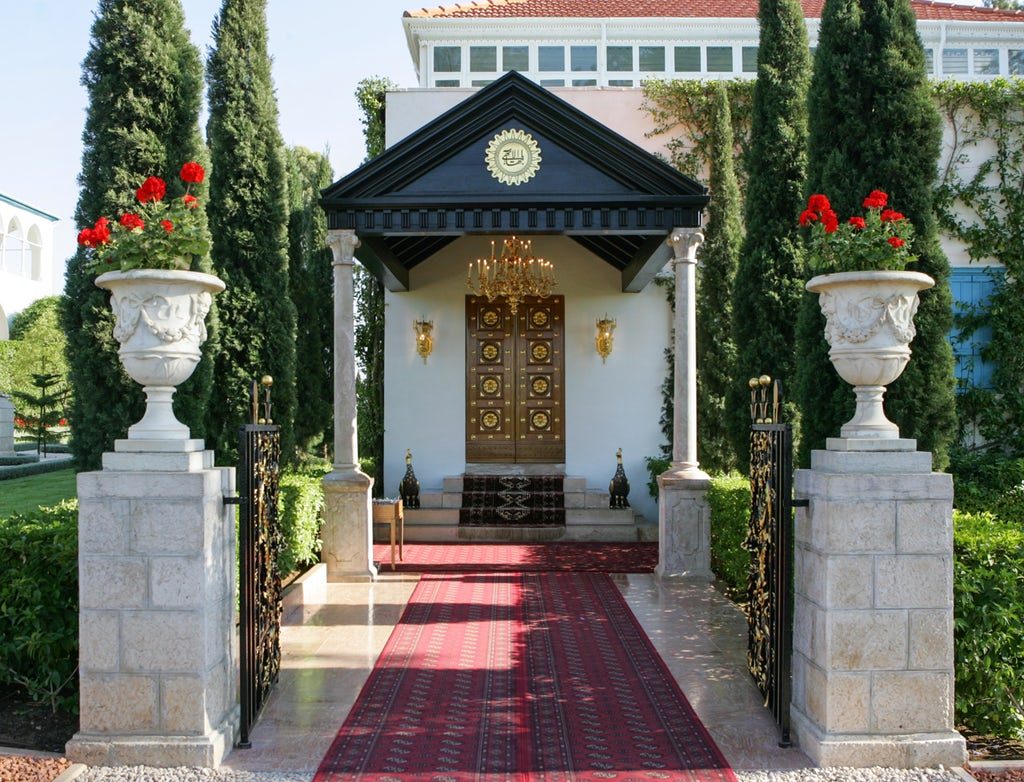Baha’u’llah was born in 1817 in Persia to a prominent and wealthy family. He was raised in Tehran and a rural provincial village, known as Nur, where he spent much of his childhood- learning horseback riding, calligraphy, and other skills considered appropriate for those of noble birth. He was not taught Arabic, and similar to Jesus, Muhammad, and the Báb, He was not trained in religion in any formal way. When he was in his late teens, his father died and Baha’u’llah assumed control of the family’s affairs. He soon freed all the family’s slaves, stating later in His revelation that “it was not for him who is himself a servant to own another of God’s servants”. His talents and capacity were well recognized and he was offered a position in the royal court, which he declined, choosing instead to serve the poor in the area around his rural home . He and his young wife turned a portion of their house into a children’s hospital for the province.
When Baha’u’llah was 27 years old, the Báb’s first and most prominent disciple communicated a message to Him through an intermediary, a message that included a Tablet from the Báb himself. Baha’u’llah opened the Tablet, read a few lines, and stated to his brother- who was standing with him at the time- that these were the words of God. Baha’u’llah remained as a background figure while the Báb’s religion played out and they never met in person, always separated by hundreds of miles.
After the execution of the Báb, a young man, disconsolate over the loss of the Báb, took it upon himself to revenge his death and attempted but failed to shoot the Shah. The event raised the ire of the royalty, who went on a rampage of mass imprisonment and execution of the Báb’s followers, of which Baha’u’llah was now one of the most prominent members. He was taken from His home and thrown into a dungeon known as the “Black Pit”. With two heavy chains around His neck and death an imminent possibility, Baha’u’llah’s revelation began. The Gospels describe the holy spirit alighting on Jesus like a “Dove” and Muhammad referred to the Voice of His revelation as the “Angel Gabriel”. Baha’u’llah described a “Maid of Heaven” appearing to Him in the Black Pit and confirming His station as the one chosen to reveal God’s will to humanity.
Baha’u’llah was then exiled from Persia to the provincial capital of the Ottoman Empire, Baghdad, where he was able to move freely about the city for the next 10 years. He gradually assumed greater leadership of the followers of the Báb, and attracted interest by a wide range of peoples who came through the city. In this broader cultural climate, Baha’u’llah continued the conversation with humanity started by the Báb, teaching the ideas of the progressive revelation of religious truth to different audiences using different genres. In the Seven Valleys, he explained the truths in the poetic language of a mystic. In the Book of Certitude, he addressed traditional theological challenges from the perspective of Christian and Muslim scripture. In 1863, in a garden that has come to be known as the “Garden of Ridvan (Paradise)”, Baha’u’llah formally declared openly His mission as the one the Bab had foretold and the fulfillment of the promises of all previous revelations.
With His revelation, Baha’u’llah declared that the standard God expected from humanity had changed. No longer was it acceptable before God to promote exclusiveness and division. The beloved of God in this Day were those who were lovers of the entire human race and worked for the benefit of all. He instructed us to have a “world-embracing vision”, to “make each day better than its yesterday” and to be “worthy of the trust of your neighbor and look upon him with a bright and friendly face”, stating that His first “counsel” was for humans to have a “pure, kindly and radiant heart”. He wanted us to open our minds as well as our hearts, to be just and fair-minded, and “look into all things with a searching eye”. He promoted scientific thinking as an expression of humanity’s God-given and fundamentally spiritual rational mind and said that humans possessed spiritual capacities that were utterly untapped. He saw gems in the hearts of human beings and His religion is meant to mine them.
As Baha’u’llah’s influence grew, the Persian and Ottoman authorities decided to suppress His impact by exiling him further away, eventually to the Crusade fortress of Akka in the Holy Land, just 100 miles from Jerusalem. From this desolate prison, Baha’u’llah revealed the major Tablets of His Revelation, including some of the Tablets to the Kings and other calls for the unity of the human race.
After the declaration of His mission, Baha’u’llah spoke with the Voice of God in all His Tablets and letters, with a power and majesty that is extraordinarily compelling. It is impossible in a single post- or a lifetime of posts- to fully capture the range and majesty of Baha’u’llah’s words. He himself described it as an “ocean inexhaustible in its riches” and invited humanity to “discover all the pearls of wisdom that lie hidden in its depths”.
Photo is of the Shrine of Baha’u’llah in the Holy Land. Courtesy of Baha’i Media Bank.
